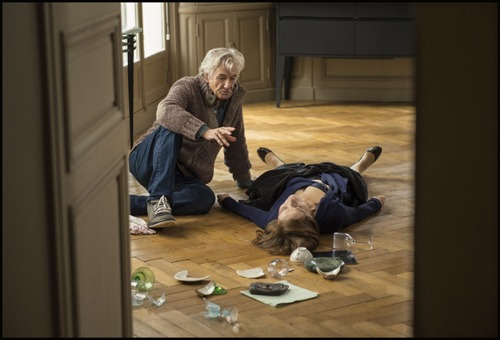
This article is a preview from the Summer 2017 edition of New Humanist. You can find out more and subscribe here.
"You will never be popular.” This warning came from veteran politician Harriet Harman to rookie MP Jess Phillips on her arrival at Westminster. And Harman of all people knew what she was talking about. Like all powerful women, she’d had to cope with decades of disdain.
In their recent memoirs both Harman and Phillips – the head girl and naughty first former of Parliament – not only offer impressive accounts of their formidable achievements, but also chronicle the endless sexism that poisons political life. And both are committed to making the path easier for the next generation.
“This is a woman who fought for women like me to get where I am,” writes Phillips of Harman. “Every moment she has spent in our democratic palace has been to make sure that girls like me can have a couple of kids, make some monumental mistakes and still stumble upon success and, in my case, one of the most powerful jobs in the land.”
But while Harman deplores the prejudices that women in public life have always had to face, Phillips rages against the newest weapon in the sex wars: internet trolling.
Revealing that she once received 600 rape threats in one day, she gives us a sample of the kind of abuse that comes tweeting her way.
You know what would be funny. Pouring molten iron down this cunt’s cunt until she starts vomiting bullets. These are the kind of people who deserve to be bound up in a basement and repeatedly raped. I think watching her spirit die as you slowly removed strips of skin would be a really rewarding experience. Remove the eyes last, she should have her mutilated broken body be the last thing she sees.
Phillips is not alone. A number of online trolls have been convicted of threats towards female MPs, including two who subjected the Liverpool MP Luciana Berger to campaigns of antisemitic abuse. In 2014 a man was jailed for 18 weeks for bombarding the Labour MP Stella Creasy with messages threatening to rape her.
And Shadow Home Secretary Diane Abbott recently broke her long silence about the constant poisonous verbal attacks that she has had to endure. Messages like “Get yourself spat at by someone with HIV and die a horrible death.”
What is striking about these attacks on women in public life is how plainly gendered they are. Women are cunts and fat cows and pigs; in the case of Abbott dollops of racism are thrown into the toxic mix.
Pathetic useless fat black piece of shit Abbott. Just a piece of pig shit pond slime who should be fucking hung (if they could find a tree big enough to take the fat bitch’s weight).
Most frequent of all is the threat of the most sexualised form of violence.“Now you can press a button and threaten to rape someone,” Abbott commented in the Guardian.
And it’s not just online where sexual assaults on women have become normalised. Rape is now so common in television crime dramas that it has ceased to shock. From Game of Thrones to The Fall, Ripper Street to Line of Duty, serial killers and mutilated women are, it seems, what thrills most.
In a recent article for the Toronto Globe and Mail the television scriptwriter Ellen Vanstone raged over how much female rape there is on TV. Game of Thrones has featured at least 50 rape acts, with 29 rape victims. Even “quality” shows, she pointed out, are not immune. “We have Anna Bates raped on Downton Abbey; police sergeant Catherine Cawood driven by the rape of her daughter, who died by suicide, in Happy Valley; Gillian recovering from years of marital rape on Last Tango in Halifax; Joan Holloway raped by her fiancé in Mad Men; Queen Mary raped by Protestant soldiers in Reign; Detective Robin Griffin dealing with fallout from her own prom-night gang rape while solving a child-rape case in Top of the Lake.
“Note how my repetition of the word ‘rape’ becomes numbing after a while,” wrote Vanstone. “It’s because seeing something over and over tends to normalise it, and eventually make it meaningless.”
Not all portrayals of rape set out to be exploitative, according to Lis Cuklanz. In her book Rape on Prime Time: Television, Masculinity and Sexual Violence, she argues that some representations of rape on television “can help us to think about sexual assault from a new angle, or in a way that we have never done before [...] They could be considered to be contributing to social change.” That was certainly the intention of the treatment of a rape case in the most recent series of Broadchurch.
But Phillips, who worked in Women’s Aid and is a powerful advocate for abused women, hasn’t seen much evidence of that change. “Where I live, a domestic violence incident is reported to West Midlands Police every twelve seconds,” she writes. “In 2016, a woman is murdered in the UK every three days. The number of sexual offences recorded in 2015 was the highest ever.”
Yet rape and murder of women continue to be staples of mainstream entertainment. They’re just as ubiquitous in crime novels – even those written by women. An honourable exception is Sara Paretsky, creator of the female detective V.I. Warshawski. Paretsky has never featured women as victims and deplores the way in which violence against women in detective fiction has become so commonplace.
“Whereas in the heyday of noir, a vamp was a villain, today the female presence in thrillers and crime fiction is often the victim of horrific assault,” she wrote in “The Detective As Speech”, an online essay. “The change began at first as a threat, but escalated rapidly into graphic rape, dismemberment and death during the making of snuff films.”
And on the big screen, two recent movies have also endorsed rape as a legitimate vehicle for thrills. Yet both have received almost universal acclaim. Tom Ford’s Nocturnal Animals won a Golden Globe award, the Special Jury Prize at Venice and received 14 Bafta nominations. Not a single critic seemed to flinch at its overt misogyny.
That was left to the columnist Victoria Coren. “If you’re the kind of person who is excited by dead, naked women, then the fear scene will be massively improved by my having told you what’s coming,” she wrote in the Observer. “Enjoy the dread, the sobbing, the terrified and hopeless maternal embrace: rape is definitely coming, death is definitely coming and you’ll get to see those corpses! With blood smeared carefully on the bums!”
Coren is scornfully dismissive of the critics who have commended the beauty of the cinematography. “The corpses look beautiful [...] They look exactly how a pair of raped, murdered women wouldn’t look. But if you want to believe that a pair of raped, murdered women would be a lovely sight to behold, then Nocturnal Animals is the film for you.”
And then came Paul Verhoeven’s Elle. Starring the impeccable Isabelle Huppert and in French – and therefore sophisticated – this film has been largely applauded as a “grown-up” exploration of women’s desires, as “brave” and even “feminist”. In fact, though, it is a full-on woman-loathing fest disguised as an intellectual treatise.
Huppert plays a tough, competent boss of a successful company who is violently raped, then gradually comes to crave her rapist. We see her masturbating while gazing through the window at him, then inviting him to do it again. And again. No matter how accomplished the performance, no matter how clever the mise en scène, this vile creation manages to reinforce some of the most time-honoured chauvinist myths: women who say no mean yes; women are asking for it; any woman who succeeds in business must be mentally deranged. Powerful women must be silenced.
"When you speak – and when you are heard – you are committing a political act,” wrote Paretsky. “Those who are silent – are silenced – have no access to change, to choice, or to control of their lives [...] The overwhelming effect of video games, of books and movies with women raped, skinned, snuffed out is to push women into a similar silence.”
This is Phillips’s message, too. “I am often contacted by young women who are looking for support and advice about how to deal with the vitriol, sexism and misogyny they face every time they speak. Most of these women tell me they’re going to stop posting blogs and tweeting about their politics and their views. The very first thing I say to every one of them is ‘Don’t stop, whatever you do. Don’t let them silence you.’” Abbott agrees that online abuse has become so “turbo-charged” that “it’s almost as if they want to drive some of us out of politics."
When their identities are uncovered these tweeters will claim that this kind of harassment is just a bit of “fun”, of laddish “banter”, that it doesn’t mean anything. But for the women on the receiving end it never feels like fun. And one horrifying event last year demonstrated just where such vicious hate campaigns can lead. An outspoken and vigorous activist, the Labour MP Jo Cox had been bombarded with brutal Twitter attacks before she was murdered. She was, appallingly, well and truly silenced.
“Every Woman” by Jess Phillips, is published by Hutchinson; “A Woman’s Work” by Harriet Harman is published by Allen Lane

